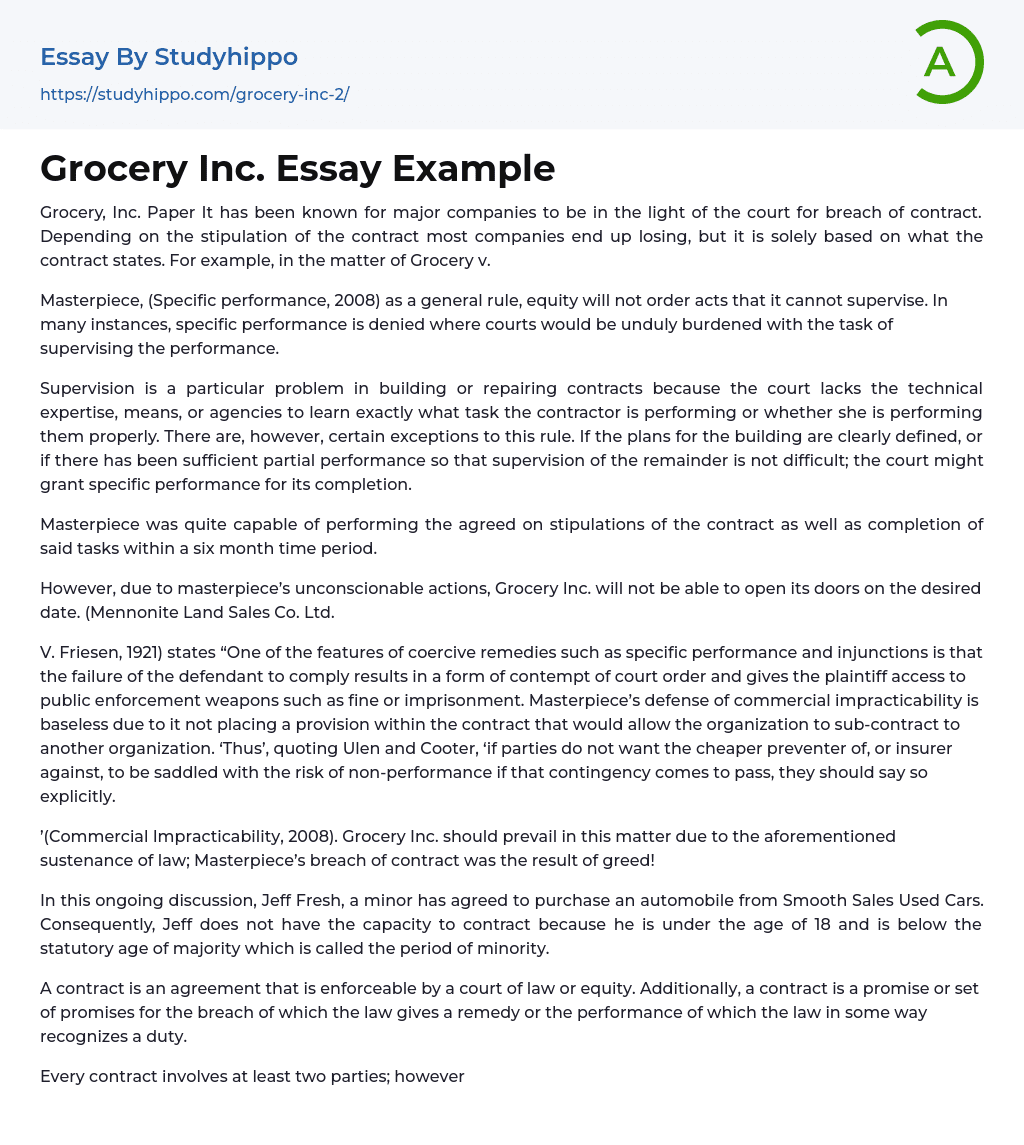Grocery, Inc. has seen major companies face legal consequences for breach of contract, with the outcome often dependent on the terms within the agreement. The case of Grocery v. Masterpiece (Specific performance, 2008) highlights how equity typically will not order actions that cannot be supervised. Concerns around supervision are particularly problematic in building or repair contracts where technical expertise may be lacking. Nevertheless, there are exceptions allowing courts to grant specific performance if plans are clearly defined or partial performance has occurred. Masterpiece had the ability to complete tasks within a six month timeframe, but their unconscionable actions have impacted on Grocery Inc.'s ability to open as planned (Mennonite Land Sales Co. Ltd).According to V. Friesen (1921), coercive remedies like specific performance and injunctions result in the defendant's contempt of c
...ourt order, allowing the plaintiff access to public enforcement weapons such as fine or imprisonment. Masterpiece's defense of commercial impracticability is unfounded as they did not include a provision in the contract allowing them to sub-contract to another organization. Quoting Ulen and Cooter (Commercial Impracticability, 2008), parties should explicitly state if they do not want the cheaper preventer of or insurer against being responsible for non-performance. Due to the sustenance of law, Grocery Inc should prevail in this matter as Masterpiece breached the contract due to greed.
In an ongoing discussion about a car purchase, Jeff Fresh, a minor, is unable to contract as he is under the age of 18 and is below the statutory age of majority called the period of minority. A contract is an enforceable agreement that requires at least two parties and promises for which the law provides a remed
or recognizes a duty.In this scenario, the contract is voidable because the offeree is a minor, and legal contracts require agreement, consideration, contracted capacity, and a lawful object. Minors may not have the maturity or experience to enter into a contract. Jeff was within his legal rights to return to Smooth Sales and inform them that he couldn't pay because he wasn't of legal age when he signed the contract. The request to return his down payment was reasonable. Furthermore, Smooth Sales should have verified Jeff's age before accepting his money. In another case involving Harry and Tom, Tom promised to sell Harry his train collection once he retired from Grocery Inc. Although Tom's promise lacked consideration, Harry relied on it reasonably and to his detriment. As a result, Harry would succeed in court on a claim of promissory estoppel.If he added a room to his house in order to provide space for the trains, then it's possible for him to file a promissory estoppel claim.
- Inn essays
- Futures Contract essays
- Mortgage Loan essays
- Renting essays
- Transaction Cost essays
- Breach Of Contract essays
- Auction essays
- Balanced Scorecard essays
- Battle essays
- Business Plans essays
- Expense essays
- Income essays
- Intranet essays
- Maintenance essays
- Net Income essays
- Security Guard essays
- Simulation essays
- Singapore Airlines essays
- Buying Homes essays
- Agreement essays
- Business Law essays
- Common Law essays
- Community Policing essays
- Constitution essays
- Consumer Protection essays
- Contract essays
- Contract Law essays
- Copyright Infringement essays
- Court essays
- Crime essays
- Criminal Law essays
- Employment Law essays
- Family Law essays
- Injustice essays
- Judge essays
- Jury essays
- Justice essays
- Lawsuit essays
- Lawyer essays
- Marijuana Legalization essays
- Ownership essays
- Police essays
- Property essays
- Protection essays
- Security essays
- Tort Law essays
- Treaty essays
- United States Constitution essays
- War on Drugs essays
- Attitude essays




